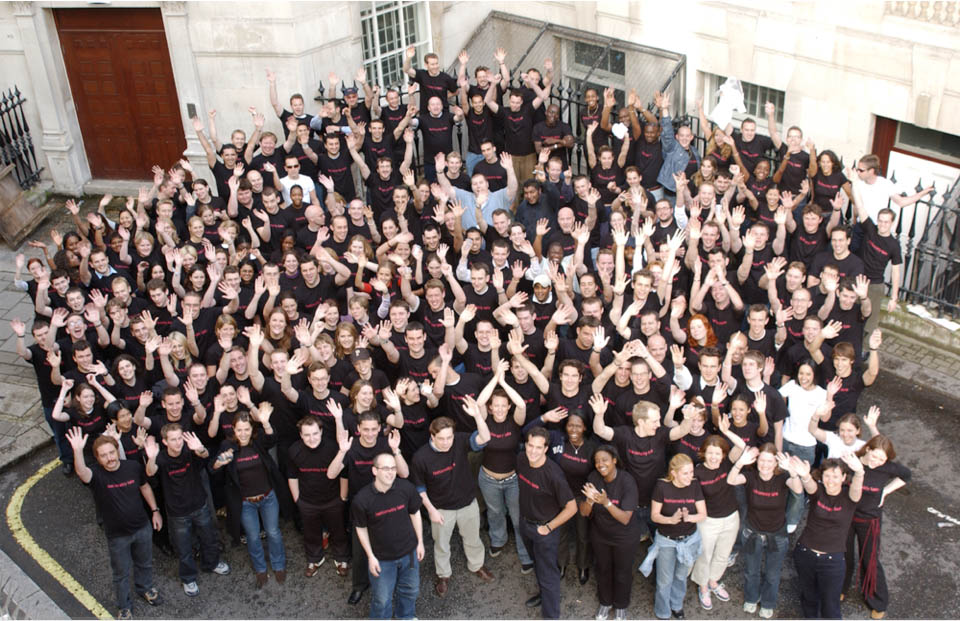c. 2001/2. Has anyone got a larger version of this?
Category: e-commerce
When I heard that Apple had bought a mobile ad company, I was quite surprised – it seemed a bit run of the mill for a ‘magical’ brand like theirs.
So watching Steve Jobs introduce the iAd platform at yesterday’s iPhone 4.0 preview yesterday, I wasn’t expecting much.
But it’s just possible, as Del Trotter might have said, that “they’ve only gone and bloody done it”.
And it is pure testament to unconstrained thinking. Audaciously, they’ve not only decided to get in the mobile ad game, but redefine it. And do better-than-TV along the way. AND suggest that search driven ads (hello Google) don’t work for mobile.
Check out the video. What do you think?
The web is awash with reaction to Rupert Murdoch’s plans to charge for newspaper content online. Is he a rare voice of reason or does he just not get it?
I think people will pay for digital content – if it’s easy enough.
The problem with handing over £0.99 to read a newspaper online is not the price – it’s just too much hassle. You have to fill in your details, confirm your email address, enter your credit cards etc. Urgh. Simple micropayments have never been cracked on the web.
Apple have shown the way forward. No-one was buying digital music till they made it easy. No-one bought mobile apps till it became a breeze to do so. The sweet integration of device (iPhone), content (apps, music, tv) and store (iTunes) removes all the barriers. They’ve made it almost fun to spend.
When paying for good content on the web is this easy, people will do it.
btw, would anyone have bought iFart on the web using a credit card?
Staying likeable
Nicholas Carr has an excellent article on how the internet, rather than removing middlemen, has spawned a mega-middleman in the form of Google.
For much of the first decade of the Web’s existence, we were told that the Web, by efficiently connecting buyer and seller, or provider and user, would destroy middlemen. Middlemen were friction, and the Web was a friction-removing machine. We were misinformed. The Web didn’t kill mediators. It made them stronger.
We know Google is a big hairy 800lb gorilla. What’s remarkable is how loved a gorilla they are. Often when companies are perceived as too successful, pressure groups form to turn on them: witness the scale of dissent around McDonald’s, Tesco, Wal-Mart, Starbucks et al.
Staying likeable when you’re massive is not easy.
So how does Google do it? There are many reasons, but I think the big three are:
- Accept no substitutes
Google aren’t dominant in search because they bullied their way onto our toolbars – they’ve earned it through being the best. I’ve come to believe that, were I to use another search engine, I’d somehow be getting substandard results - Free to consumers
Pretty much everything Google offer to consumers is free: search, gmail, image search, Docs (an excellent alternative to Office) and more. Imagine how Starbucks could quell its detractors if it could give its lattes away for zip (btw – could they do that??). - Constant wow factors
From streetview to moon maps to witty gmail features, Google come across as a company that does stuff for fun – they love life, they love the web and they’re not a place where killjoy accountants have wrestled control.
This all adds up to a feeling that Google is on our side. Who cares if industries get shaken out or that a corporation knows our intimate secrets? It’s more than a fair bargain, thanks.
Can they sustain this? Sure for the next year or two, but people move on (or retire rich) and cultures change. Can the next wave of Googlers continue to woo us? Will a future CFO be tempted to put ads on the home page? Will shareholders demand ‘new ways of monetisation’?
Will we still love them tomorrow?

